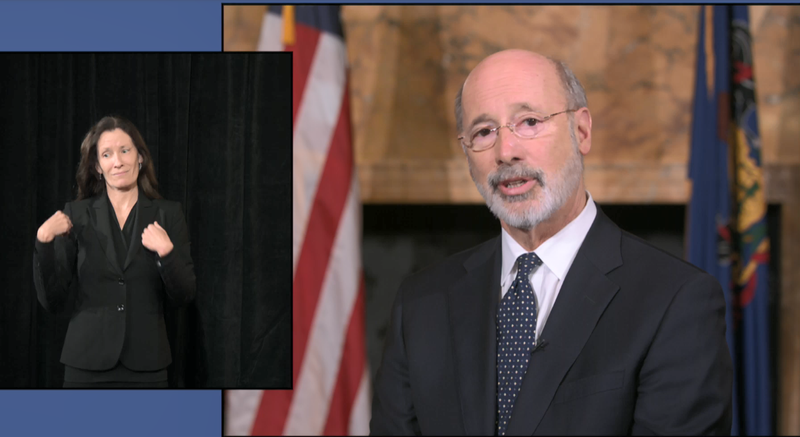PITTSBURGH (Newsradio 1020 KDKA) - Pennsylvania Governor Tom Wolf announced Friday his plans to begin to slowly reopen the commonwealth’s businesses, but did not give a timeline.
During an address, Wolf revealed plans for “relief, rebuilding and recovery.”
Wolf says that social distancing is working and it is not time to open up all businesses, but it is time for a plan.
He adds PA has not made enough progress to “declare victory” over the coronavirus.
The governor says that he is anxious to reopen the state’s economy.
Wolf laid out the following six steps that will need to take place to begin to reopen PA:
- Our approach will be data driven and reliant upon quantifiable criteria to drive a targeted, evidence-based, regional approach to reopenings in Pennsylvania.
- We will put forth guidance and recommendations for employers, individuals, and health care facilities for assured accountability as we reopen.
- Reopening necessitates that adequate personal protective equipment and diagnostic testing are available.
- Reopening requires a monitoring and surveillance program that allows the commonwealth to be deploy swift actions for containment or mitigation.
- Protections for vulnerable populations must remain steadfast throughout the reopening process, such as limitations on visitors to congregate care facilities and prisons.
- Limitations on large gatherings unrelated to occupations should remain in place for the duration of the reopening process.
Wolf adds that more specific details will be unveiled next week.
The following framework and programs were announced to help citizens recover:
- Fair, family-sustaining wages for all Pennsylvanians.
- Expand worker protection for workers following Department of Health orders or guidance from health care providers to isolate and quarantine.
- Expand paid sick and family and medical leave policies.
- Expansion of safe, affordable, and high-quality child care.
- Strengthen the Unemployment and Workers Compensation Insurance systems.
- Funding and flexibility to support continuity of education and continued active distance learning (including planned instruction and enrichment) for all students, including a focus on equity and students with special needs.
- Accountability and transparency for spending and dispensation of federal, state, and local resources to address the COVID-19 pandemic.
- Expand student loan forgiveness and repayment programs, particularly focusing on debt relief for individuals who are the front lines of responding the COVID-19 disaster.
- Expand rapid re-employment programs to support laid off workers and businesses impacted by COVID-19-related business closures.
- Accountability and transparency for spending and dispensation of federal, state, and local resources to address the COVID-19 pandemic.
Concerning businesses:
- Developing an evidence-based state innovation strategy that allows Pennsylvania to attract the best and brightest people and companies.
- Vigorous financial support for small businesses, both short term to limit the number of businesses that would otherwise have to close their doors for good while we shelter in place, and long term as small businesses restructure and recover in a post-COVID-19 economy.
- Economic development incentives to attract companies willing to create and retain good-paying jobs.
- Investments in our manufacturing industry who has risen to the challenge of meeting some of our most pressing and immediate needs, including tax credits for manufacturers who convert or retrofit their facilities or operations in order to produce personal protective equipment to help with the COVID-19 response.
- Investment, upgrade, and extension of Pennsylvania’s broadband network to ensure all Pennsylvanians have access to the internet. This includes resources for students/families/workers and/or incentivizing businesses to expand access to broadband to support remote learning and job search activities.
- Investments in our diverse agriculture industry, robust food processing sector, farmers markets, and the many industries that support a safe food supply. While this industry is life-sustaining, it has suffered a severe disruption in its supply chain, and recovery must ensure the certainty and future of Pennsylvania’s agriculture industry to continue to produce a safe, secure food supply.
- Support for non-profit organizations.
- Significant increases in housing services and investment in low-income housing development to reduce the number of Pennsylvanians unable to be safely discharged due to lack of shelter and to promote health and wellness in community settings.
- Continued prioritization of home and community-based services to reduce congregate placements for children, individuals with disabilities, and seniors.
- Increased and more formalized role for community-based organizations in health and wellness activities and health care delivery. This pandemic has made clear that health does not begin and end in the doctor’s office, let alone in a hospital, and Pennsylvania’s community-based organizations have an important role to play.
Pennsylvania is 5th in the nation for most cases of COVID-19 and it has been over 40 days since the first confirmed case of COVID-19 in the commonwealth.
Wolf also discussed how more staff at unemployment offices are being brought on to meet demands and that businesses and others will be available for unemployment that have not been in the past.
Read more about the governor's plan here.
___Listen to KDKA Radio on the RADIO.COM AppTell your smart speaker to "play News Radio 10 20 KDKA"Receive email updates from KDKA RadioFollow KDKA Radio: Facebook | Twitter | Instagram


